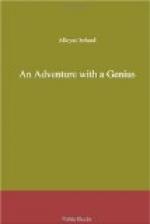I saw a great deal of Mr. Pulitzer while we were at Wiesbaden, owing to the circumstance that Paterson was called to England on urgent private affairs and Pollard was away on leave. The absence of these two men was as much regretted by the staff as it was by J. P. himself. Paterson was, from his extraordinary erudition, seldom at a loss for a topic of conversation which would rivet J. P.’s attention, and Pollard, who had been a number of years with J. P., was not only, on his own subjects, the conversational peer of Paterson, but was in addition, from his soothing voice and manner and from his long and careful study of J. P., invaluable as a mental and nervous sedative.
It was at Wiesbaden that I first began to read books regularly to J. P. I read him portions of the biographies of Parnell, of Sir William Howard Russell, of President Polk (very little of this), of Napoleon, of Martin Luther, and at least a third of Macaulay’s Essays.
He was a great admirer of Lord Macaulay’s writings and read them constantly, as he found in them most of the qualities which he admired— great descriptive power, political acumen, satire, neatness of phrase, apt comparisons and analogies, and shrewd analysis of character. Many passages he made me read over and over again at different times. I reproduce a few of his favorite paragraphs for the purpose of showing what appealed to his taste.
From the Essay on Sir William Temple, the following lines referring to the Right Hon. Thomas Peregrine Courtenay, who, after his retirement from public life, wrote the Memoirs of Temple and stated in his preface that experience had taught him the superiority of literature to politics for developing the kindlier feelings and conducing to an agreeable life:
He has little reason, in our opinion, to envy any of those who are still engaged in a pursuit from which, at most, they can only expect that, by relinquishing liberal studies and social pleasures, by passing nights without sleep and summers without one glimpse of the beauty of nature, they may attain that laborious, that invidious, that closely watched slavery which is mocked with the name of power.
More often than any others I read him the following passages from the Essay on Milton:
The final and permanent fruits of liberty are wisdom, moderation, and mercy. Its immediate effects are often atrocious crimes, conflicting errors, scepticism on points the most clear, dogmatism on points the most mysterious. It is just at this crisis that its enemies love to exhibit it. They pull down the scaffolding from the half-finished edifice: they point to the flying dust, the falling bricks, the comfortless rooms, the frightful irregularity of the whole appearance; and then ask in scorn where the promised splendor and comfort is to be found. If such miserable sophisms were to prevail there would never be a good house or a good government in the world.




